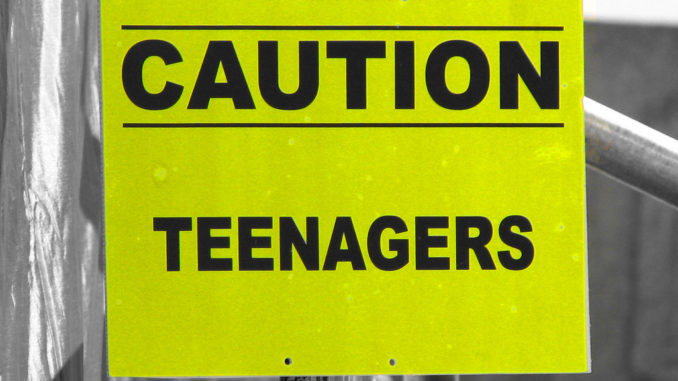
Any suggestions on how to stay calm while teaching my teenager to drive? Asked by Maria – Shreveport, LA
 I’m going through the exact same thing! The thing that has worked for me is to keep the driving doses very small. My son definitely gets tired if he drives for a while, and then loses some focus and I lose my patience. We are also having him keep his learning permit for a very long time — a full 12 months — so we can lots of these “short” practices. But the teenage brain is by nature very chaotic, so I suggest you just buckle up for the bumpy ride. God willing, your teenager will make it through safely and you’ll be left with only a few gray hairs from the experience. Amy C. – 40 something
I’m going through the exact same thing! The thing that has worked for me is to keep the driving doses very small. My son definitely gets tired if he drives for a while, and then loses some focus and I lose my patience. We are also having him keep his learning permit for a very long time — a full 12 months — so we can lots of these “short” practices. But the teenage brain is by nature very chaotic, so I suggest you just buckle up for the bumpy ride. God willing, your teenager will make it through safely and you’ll be left with only a few gray hairs from the experience. Amy C. – 40 something
 I just taught my teenager how to drive, and you know what? You may not be able to stay calm. It is completely nerve racking to be sitting in the front seat as your child gets behind the wheel. What you can do, is to get very good at self-management, so that you can teach your child to drive without stressing her out.
I just taught my teenager how to drive, and you know what? You may not be able to stay calm. It is completely nerve racking to be sitting in the front seat as your child gets behind the wheel. What you can do, is to get very good at self-management, so that you can teach your child to drive without stressing her out.
First acknowledge that this is a big step for both of you and that your stress is completely natural and expected. Take a moment to congratulate yourself for getting your child this far and for being the kind of parent that is truly engaged in your child’s life. Yay you!
Second; choose to drive with her when you are not rushing anywhere, there isn’t a lot of traffic and you feel well rested.
Third; focus on giving your child what she needs in order to become a great driver. The more you focus on her, the less you will be focusing on your own stress and anxiety. Where are her weaknesses and where are her strengths? As your child is driving, feed her acknowledgment sandwiches:
1. First layer of the sandwich is pointing out what she did well: “Wow honey, I like the way you started slowing down long before you had to stop.” (You can leave out the part about how last time she slammed on the brakes so hard, you almost ended up in the backseat of the car in front of you.)
2. Middle of the sandwich is constructive feedback; “It’s important that you actually stop at stop signs and look both ways before proceeding. Rolling stops cause accidents.”
3. And then another acknowledgement; “I like the way you are focusing on what is in front of you AND behind you by looking in your rear view mirror. You really are aware of your surroundings and the other drivers on the road.” (Again, leave out the part about how she is driving so close to the right side of the road, she almost took the side mirror off of about 10 cars in the last block.)
4. Enjoy the process. Before you know it, this part of parenthood will be over too.
Jamee – 40 something
 You have to physically relax myself-use imagery of positive thoughts or just some deep breaths before you start.
You have to physically relax myself-use imagery of positive thoughts or just some deep breaths before you start.
Set up some guidelines with your teenager. Ours is that what the guiding adult in the passenger seat says is law. If we say slow down-they must slow down or relinquish the driver’s seat. This is a safety issue.
Remind them that they are driving a machine that could do severe damage to everyone around them. Tell your teenager that you WILL be talking and pointing out everything to them while they drive and that they can’t tell you to be quiet. (One of their favorite things to do to adults) Good luck! Most kids learn how to drive successfully and without accidents-or at least big ones. Ann – 50 something
 Well, having graduated three daughters from the stroller to the steering wheel, here are my suggestions.
Well, having graduated three daughters from the stroller to the steering wheel, here are my suggestions.
Make sure they know all the traffic laws, and keep things simple by practicing in a large, empty church or school parking lot so they get the feel of the car and you get an idea of their capabilities and level of confidence. Then cruise the neighborhood streets when traffic is light. Monitor them to make sure they are following the rules, but don’t permit yourself to yell, be too critical, or get overexcited. The key word is gentle for you both. Gently give it the gas, gently put on the brakes, and gently correct any mistakes. Keep the conversation light so they don’t feel you are hovering or watching their every move. Otherwise you will both get tense and irritated with each other. Keep them away from freeways or other heavy traffic areas until you are certain they can maneuver them without either of you going into a panic. As they become more experienced you will relax and actually enjoy the time together.
Also, don’t be afraid to ask someone else to do the teaching. Sometimes it is better to divorce yourself from the situation and let a professional or more objective person give the lesson. If you are really worried, save the family car and check out Rent A Wreck! Marge – 70 something




I am going through the same emotions these days. My best advise would be to spend some money and employ a driving instructor. They will do the heavy lifting. Let’s face it, we don’t drive by the book anymore. It has been a few years since we learned how to drive and we may have picked a few bad habits along the way. The advise I love most is to take it slow and have short drives when the traffic is quieter. They get bored with driving very quickly. Then, don’t hesitate to take the driving wheel.